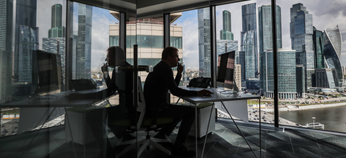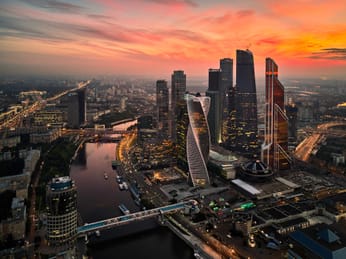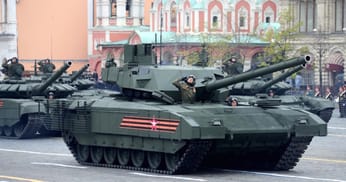
THE BELL WEEKLY: Ruble woes
Hello! This week our top story is about the falling Russian ruble, which last week saw its worst-performing week this year. We also look at why many Russian officials are now blocked from traveling abroad and the defection of a high-ranking security officer who was involved in protecting President Vladimir Putin.
The ruble suffers its worst week of 2023
Just under a year ago, the Russian ruble was named the best performing currency in the world. As a result of currency controls introduced by the Russian authorities and a sharp drop in import volumes, it rose in value after the invasion of Ukraine to levels not seen since 2014. Now, however, those boom times are gone. Last week, the ruble fell five days in a row.
- Despite the unexpected recent announcement by oil cartel OPEC+ that they were suddenly cutting production — triggering oil price rises — the Russian currency in April has been displaying the worst dynamics of any developing world currency. There are likely several reasons for the ruble’s fall.
- Above all, it seems to have been caused by oil major Shell exiting the huge Sakhalin-2 gas project. The company is not only set to take out more than $1 billion in assets from Russia, but also claim part of its dividend. In pre-war times, the Russian currency market would barely have reacted to such an outflow. Cut off from global financial systems as a result of the Ukraine war, however, it is suffering from greatly reduced liquidity.
- The ruble’s problems may also be linked to new budget rules introduced in January. Budget rules are the mechanism Russia uses for distributing revenues from commodity exports. If oil and gas revenues go above a certain level, Russia purchases Chinese yuan with the surplus. If revenues are lower, Russia sells yuan to support the ruble.
- It emerged on Wednesday that, this month, the Finance Ministry reduced sales of the yuan by about 40% because of a rise in oil and gas revenues the previous month. Against a backdrop of a shortage of yuan in the banks, this could further weaken the ruble, according to Natalia Orlova, chief economist at Alfa Bank.
- The Russian authorities themselves attribute the falling ruble to a reduction in the inflow of foreign currency from exports coupled with a rise in imports. Finance Minister Anton Siluanov said he hopes that the Russian currency will soon rise due to the growing oil prices. However, there will be some delay before this additional revenue hits the market.
- Analysts are not rushing to revise their forecasts for the rubles despite the turbulent week on the currency market. They still see the ruble rate in 2023 in the region of 75-80 rubles to the U.S. dollar. But the big issue is not the price against the dollar — it’s the volatility. The implied monthly volatility for the ruble (the indicator of how the market anticipates future exchange rate fluctuations) hit 30% last week. That’s significantly worse than toxic third-tier securities or crypto-currencies.
Pourquoi le monde doit-il s'en préoccuper ?
In one of her first interviews as chairman of the Central Bank, Elvira Nabiullina defined one of the hallmarks of stability as “a strong economy that has a strong exchange rate.” That seems a long way off. In the long term, ruble volatility weakens the currency’s usefulness as a means of saving or making payments — and makes investors very wary.
Des hauts fonctionnaires russes font l'objet d'une interdiction de voyager
Depuis le début de la guerre, les fonctionnaires russes et les employés des entreprises publiques ont du mal à voyager. La raison n'en est pas seulement les sanctions occidentales, même si elles ont touché de nombreuses personnes. En effet, les fonctionnaires et les employés des entreprises publiques russes ont été soumis à de nouvelles restrictions strictes en matière de déplacements.
- Les changements récents signifient que tous les hauts fonctionnaires - des ministres aux chefs de département - ne peuvent voyager à l'étranger qu'avec l'autorisation expresse du Premier ministre Mikhail Mishustin. Et cette autorisation n'est accordée qu'en cas de nécessité opérationnelle évidente, selon des sources qui se sont confiées à The Bell.
- Dans le même temps, les employés du Kremlin ne sont pas soumis à de telles restrictions, selon deux des sources de The Bell. L'une d'entre elles a attribué cette différence au "zèle particulier" de Mishustin. Cependant, la plupart des employés du Kremlin "n'essaient même pas" d'aller quelque part, a rapporté la chaîne Current Time en mars, citant une source proche du Kremlin. Un autre contact de la chaîne de télévision a souligné que plusieurs membres du personnel du Kremlin se sont rendus dans des pays "neutres" au cours de l'année écoulée et que leurs voyages ont été approuvés par Anton Vaino, le chef de cabinet du président Vladimir Poutine.
- Plusieurs autres éléments indiquent que les fonctionnaires russes d'autres agences et les dirigeants d'entreprises publiques ont plus de difficultés à se rendre à l'étranger. Certains d'entre eux ont été contraints de remettre leur passeport. Les médias ont également rapporté que, pendant les vacances du Nouvel An, les fonctionnaires de niveau national et régional ont été interdits de quitter la Russie.
- Le Moscow Times a rapporté le mois dernier que le Service fédéral de sécurité (FSB) tient une base de données des fonctionnaires, gouverneurs et autres employés de l'État qui doivent obtenir une autorisation spéciale pour quitter le pays. "Un rideau de fer est en place pour les personnes associées à l'État", a déclaré à l'époque un haut fonctionnaire du gouvernement russe.
- Selon un récent rapport du Financial Times, même les fonctionnaires de rang intermédiaire et les cadres des entreprises publiques qui n'ont pas accès à des informations classifiées sont contraints de rester chez eux.
- Le porte-parole de M. Poutine, Dmitri Peskov, a déclaré au FT que les restrictions sur les voyages à l'étranger avaient été renforcées pour les travailleurs des secteurs sensibles. "Dans certains endroits, [les règles] sont formalisées, dans d'autres, elles dépendent de décisions spécifiques concernant des employés spécifiques", a-t-il déclaré.
Pourquoi le monde doit-il s'en préoccuper ?
Avant la guerre, seuls les responsables de la sécurité russe (qui ne pouvaient se rendre que dans des pays "amis" comme la Biélorussie ou Cuba) et les officiers du renseignement (généralement interdits de voyage à l'étranger) étaient soumis à des restrictions de voyage. Toutefois, il semble désormais évident que ces restrictions de voyage s'appliquent aux fonctionnaires ordinaires et aux directeurs d'entreprises publiques. Il est difficile de ne pas y voir une paranoïa croissante au Kremlin.
Security officer who fled Russia tells of Putin’s growing isolation
Dossier, an investigative center linked to former Russian oil tycoon Mikhail Khodorkovsky, last week published an interview with a captain in the Federal Guards Service (FSO) who fled abroad in protest at the war. Gleb Karakulov served for 13 years in the FSO, which is responsible for the president’s personal safety. Karakulov's role involved providing secure communications for the head of state on work trips in Russia and abroad. Although he never once spoke to Putin during his career, Karakulov made almost 200 trips and understands very well how the president has become ever more isolated from the outside world.
- Karakulov was only a couple of years away from retirement. However, he said that he “could not remain in the service of this president” after the war broke out and regards Putin as a war criminal. Karakulov “fled” from the FSO in October during a trip to the Kazakh capital, Astana, where Putin was taking part in the “Russia – Central Asia” summit. Karakulov, along with his wife and daughter, flew from Astana to Istanbul. In early November, the apartments of his relatives in Russia were apparently searched and the former officer was accused of desertion. Now, he faces up to 15 years in jail if he ever returns to Russia.
- Putin does not use the internet or a mobile phone and gets all his information “only from people who are close to him,” according to Karakulov. When preparing a “residence” (like a hotel suite) for a visit from the Russian president, he said, there is a requirement that Russian TV channels must be available.
- According to Karakulov, Putin remains in self-isolation and those who plan to meet him are expected to spend two weeks in quarantine, even if the event is to last less than 20 minutes. “Everyone is at a loss as to why this is still going on,” said the FSO officer. He believes that the president is afraid for his health, although he has no “super critical” problems. In total, since 2009, Putin has canceled just a couple of trips due to illness, according to Karakulov.
- Karakulov also said that on every foreign trip, Putin brings a “talking booth,” a 2.5m high cube with a workspace and a telephone through which you can speak without fear that the conversation will be intercepted by foreign intelligence.
- Putin has changed a great deal since 2009, Karakulov told Dossier. “In terms of behavior, they are two different people,” he said in the interview. “We remember how, when the former FSB director became Prime Minister, and then president, he was so active, so energetic. Of course, until 2020 he was still just as active, judging by the many business trips he made. But now he is very closed off. He is putting up all possible barriers between himself and the world, maintaining the same quarantine, the same lack of information. His perception of reality is distorted.”
Pourquoi le monde doit-il s'en préoccuper ?
Dossier describes Karakulov as the highest-ranking intelligence officer to leave the country since the war broke out. According to Karakulov, Putin has the support of almost all his colleagues, casting doubt on the theory that he could be overthrown in a coup.









